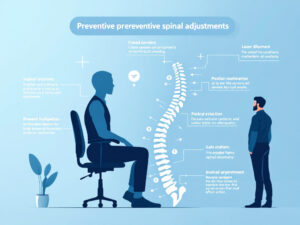Benefits of Prenatal Massage
Prenatal massage therapy offers numerous benefits tailored specifically for pregnant individuals. Here, we highlight key advantages including stress reduction and pain relief.
Stress Reduction and Relaxation
Prenatal massage is effective in alleviating stress by reducing inflammation in weight-bearing joints and relieving discomfort in active individuals. Studies have shown that massage therapy during pregnancy can mitigate swelling (edema) by stimulating soft tissues, which enhances lymphatic drainage American Pregnancy Association. Regular relaxation massages can also address symptoms of depression and anxiety, improve immune function, and even lower cortisol levels, making it more effective than standard relaxation techniques like progressive muscle relaxation NIH.
| Benefit | Description |
|---|---|
| Reduces inflammation | Eases pressure on weight-bearing joints and reduces discomfort. |
| Alleviates edema | Stimulates soft tissue to improve lymphatic function. |
| Decreases cortisol | Results in lower stress levels and improved emotional well-being. |
| Enhances immune function | Boosts overall health during pregnancy. |
Pain Relief and Improved Circulation
Prenatal massage helps relieve common discomforts associated with pregnancy, such as lower back pain, sciatica, and headaches. By improving circulation, it can alleviate symptoms like varicose veins and swelling in the hands and feet. Additionally, prenatal massage can calm nerves, leading to better sleep and reduced anxiety levels Press Modern Massage.
Importantly, prenatal massage should not be performed during the first trimester unless approved by a healthcare provider ReAlignMed. Research indicates that massage therapy can significantly alter hormone levels related to relaxation and stress, yielding positive effects on cardiovascular health and mood regulation American Pregnancy Association.
| Benefit | Description |
|---|---|
| Eases discomfort | Reduces back pain, headaches, and other pregnancy-related aches. |
| Improves sleep | Helps promote relaxation and calmness. |
| Enhances circulation | Increases blood flow, reducing swelling and discomfort. |
| Boosts mood | Regulates hormone levels associated with stress and relaxation. |
Prenatal massage therapy serves as a supportive approach to manage the unique challenges of pregnancy. For further wellness practices, consider services like muscle soft tissue therapy or exercise therapy prescription offered at Lucas Chiropractic.
Safety and Precautions
When considering prenatal massage therapy during pregnancy, understanding safety and precautions is essential. This ensures both you and your baby remain healthy while receiving the benefits of massage treatment.
Avoiding Deep Pressure and Abdominal Massage
Pregnancy massage therapists typically avoid applying deep pressure, particularly on the legs. This precaution is essential to reduce the risk of blood clots in pregnant women [1]. Gentle techniques are preferred to promote relaxation and alleviate discomfort without compromising safety.
Additionally, abdominal massage should be approached with caution. Many therapists avoid this area entirely during massage due to potential complications, especially in the earlier stages of pregnancy.
| Risk Factor | Recommended Action |
|---|---|
| Deep Pressure | Avoid to prevent blood clots |
| Abdominal Massage | Should be withheld for safety |
| Leg Massage | Use gentle techniques only |
Approaching Massage in the First Trimester
The first trimester is a critical period in pregnancy. Due to potential concerns about miscarriage, many massage therapists refrain from offering prenatal massage during this phase [1]. Although no research has directly linked massage to miscarriage, there is a level of caution adopted by practitioners.
Western-trained doctors may recommend avoiding massages during this early stage due to a lack of established scientific guidelines. It is advisable to seek clearance from a healthcare provider before considering massage therapy during the first trimester, particularly if any high-risk factors are present [1].
Although some therapists argue that prenatal massage does not negatively affect pregnancy, it’s vital to understand that many remain cautious to protect against any potential risks or liability issues.
For those interested in the importance of safe massage practices during pregnancy, consider exploring our services, which also include holistic wellness care to support your overall well-being during this special time.
Training and Certification
Requirements for Prenatal Massage Therapists
To become a prenatal massage therapist, individuals typically need to complete a comprehensive training program that includes specific coursework in prenatal massage techniques. Prenatal massage training usually involves 24 to 32 hours of instruction divided over three to four days of classes, in addition to required hands-on practice hours following the completion of the program for certification Natural Healers. It’s essential to ensure that your therapist has received proper training and certification to provide safe and effective massage therapy during pregnancy.
General massage therapy programs typically require approximately 500 hours of education. Some programs include training in pregnancy massage, while others do not. Therefore, it is vital to inquire about a therapist’s specific experience in prenatal massage before booking an appointment.
| Training Component | Hours Required |
|---|---|
| Core Massage Therapy Education | 500 |
| Prenatal Massage Specific Training | 24 – 32 |
| Hands-on Practice | Varies |
Tuition Costs and Employment Outlook
The cost of prenatal massage training programs can vary widely depending on the institution and the depth of the program. It’s important to consider these costs when deciding to pursue a career in prenatal massage therapy. Upon successful completion of all 32 workshop hours in prenatal massage therapy, therapists are awarded a certificate of completion verifying 32 Continuing Education (CE) hours, enabling them to work effectively throughout the childbearing year with various pregnancy types, including normal to high-risk pregnancies Body Therapy Education.
Employment for massage therapists, including those specializing in prenatal massage, is projected to grow at a rate of 17.7% through 2033. This growth is attributed to the increasing interest in wellness care and the acceptance of massage therapy as a complementary treatment Natural Healers.
| Employment Outlook | Projected Growth Rate | Median Salary |
|---|---|---|
| Massage Therapists | 17.7% | $57,950 |
Understanding the training requirements and future employment outlook in the field of prenatal massage therapy can help you or your loved one make informed decisions about this rewarding career in wellness care. Whether you are seeking therapy for yourself or pursuing certification, choosing a professional who is well-trained and knowledgeable in prenatal techniques is crucial. For additional wellness services, consider exploring our pregnancy massage support and related wellness services.
Specific Techniques and Positions
When considering prenatal massage therapy, it’s essential to use safe techniques and positioning to ensure comfort and safety throughout the treatment. Here, you’ll learn about appropriate positioning for pregnancy massage and gentle techniques specifically designed for swollen feet.
Safe Positioning for Pregnancy Massage
During a pregnancy massage, the positioning of the client is crucial for creating a comfortable and safe experience. The recommended method is a supported side-lying or semi-reclined position. In this setup, pillows play a vital role in providing support. They can be placed under the head, between the knees, between the ankles, and along the belly to help relieve back pressure [2].
It’s important to avoid deep massage and strong pressure on the legs to reduce the risk of blood clots in pregnant women [1]. Additionally, as pregnancy progresses, particularly after 36 weeks, it’s advisable to seek approval from your OB-GYN before receiving a massage. Always opt for a licensed therapist who specializes in prenatal massage to ensure proper care.
Gentle Techniques for Swollen Feet
Swollen feet are a common issue during pregnancy, and gentle massage techniques can help alleviate discomfort. Lymphatic massage is particularly effective for reducing swelling and enhancing circulation. During this process, it’s crucial to be cautious about the areas being massaged. Pressing on the inner calf and thigh areas should be avoided to minimize the risk of deep vein thrombosis (DVT) [2].
When performing techniques for swollen feet, focus on long, gentle strokes rather than deep pressure. Keeping hands flat and using soft, firm motions will promote relaxation and comfort. Remember to always prioritize your well-being during these treatments.
For further assistance and support, consider exploring options like pregnancy massage support or consult with health professionals about additional services that enhance your prenatal experience.
Health Benefits for Pregnant Women
Prenatal massage therapy offers numerous advantages for expectant mothers, addressing both physical discomforts and mental well-being. Here are the key benefits you can experience from this form of therapy.
Alleviating Pregnancy Discomforts
During pregnancy, your body undergoes significant changes that can lead to various discomforts such as muscle tension, back pain, and fatigue. Safe massage techniques can effectively help you cope with these physical challenges.
| Common Discomforts | Benefits of Prenatal Massage |
|---|---|
| Lower Back Pain | Eases tension and soreness |
| Varicose Veins | Reduces swelling and improves circulation |
| Swelling in Hands and Feet | Enhances fluid drainage |
| Sciatica | Alleviates nerve pain along the leg |
| Carpal Tunnel Syndrome | Relieves pressure on the wrist |
| Headaches | Reduces frequency and intensity |
| Fatigue | Promotes relaxation and restores energy |
According to Press Modern Massage, prenatal massage focuses on relieving stressors like joint aches and headaches, making it a beneficial part of your wellness routine. By promoting circulation and reducing inflammation in weight-bearing joints, you can experience relief from discomfort as you navigate your pregnancy journey.
Supporting Mental Health and Well-Being
Prenatal massage also plays a crucial role in enhancing your mental health during pregnancy. The therapeutic effects of massage can help reduce anxiety and promote relaxation. It provides a moment of serenity, allowing you to unwind amidst the challenges of pregnancy.
Research indicates that prenatal massage supports mental well-being by alleviating stressors related to your changing body and mind. This form of therapy can help with issues such as:
- Anxiety
- Depression
- Stress
Improved relaxation from massage can lead to better sleep patterns, allowing you to recharge effectively. Engaging in prenatal massage therapy can also foster a stronger bond with your baby by providing a moment to focus on your well-being and nurturing connection.
For additional support during your pregnancy, consider our pregnancy massage support services or explore other wellness options designed to enhance your experience.
Research Findings
Positive Effects on Anxiety, Depression, and Pain Relief
Research shows that prenatal massage therapy can significantly improve mental and emotional well-being for expectant mothers. Studies indicate that women receiving bi-weekly massages during their pregnancy experience substantial changes in their hormone levels, leading to improved mood stability and stress regulation. Hormones such as norepinephrine and cortisol, which are linked to stress, decrease, while dopamine and serotonin — hormones associated with happiness and relaxation — increase [3].
In a study involving depressed pregnant women, those who received massage reported notable reductions in depression and anxiety levels. Additionally, these women experienced less leg and back pain and showed lower cortisol levels compared to those who did not participate in massage therapy. The benefits of prenatal massage extend beyond immediate relief; the positive hormonal changes contribute to fewer complications during childbirth and better overall health outcomes for newborns [4].
| Hormone Changes | Effect on Mood |
|---|---|
| Decreased Norepinephrine | Reduced Stress |
| Decreased Cortisol | Lower Anxiety |
| Increased Dopamine | Improved Mood |
| Increased Serotonin | Alleviated Depression |
Impact on Birth Outcomes and Newborn Health
The benefits of prenatal massage therapy are not limited to the mother alone; they extend to the health of the baby as well. Recent research suggests that massage therapy during pregnancy can result in fewer complications during birth. Not only do mothers report decreased pain and improved emotional well-being, but these positive outcomes also reflect on the newborn. Fewer complications observed in infants include improved sleep, relaxation, and reduced instances of anxiety [5].
Moreover, infants of mothers who received regular massages during pregnancy tend to have better overall health metrics, such as improved sleep quality and relief from common issues like eczema. Given these findings, prenatal massage therapy emerges as a vital component of holistic prenatal care, emphasizing the importance of a nurturing approach throughout pregnancy.
Incorporating services like prenatal massage therapy into your care routine can help ensure a healthier and more supportive experience during this transformative time. If you are interested in nurturing wellness during your pregnancy journey, consider exploring our pregnancy massage support as part of your overall care regimen.




